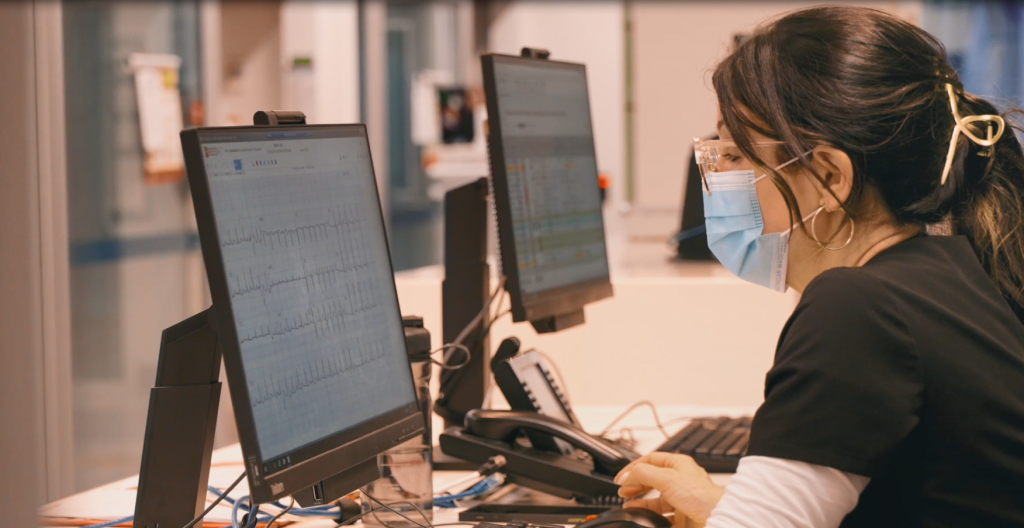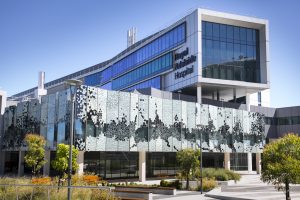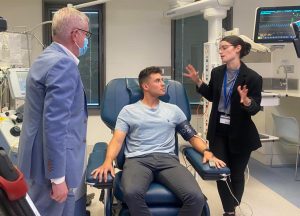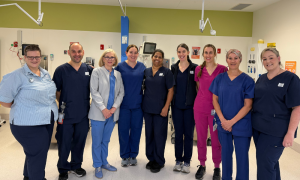Central Adelaide clinicians are helping to study South Australia’s unique experience with the COVID-19 pandemic, with findings having the potential to predict and prevent the virus in the future.
Clinicians from the Infectious Diseases Unit and ICU at the RAH are collaborating on the COVID-19 SA Study with partners from the BioMed City precinct, including University of Adelaide, the Women’s and Children’s Hospital and SAHMRI.
Since the first COVID-19 patients began to be treated at the RAH, patients have been recruited to the study from different patient cohorts.
Researchers are monitoring the experience of patients and looking at the impacts of vaccination, COVID symptoms and development of long COVID syndrome.
The first cohort of 78 patients are now two years into the study and will continue to be monitored this year. Research Manager of Infectious Diseases, Catherine Ferguson says this group is unique as up until recently they were unlikely to have been re-exposed to COVID after their initial infection given SA’s border restrictions. This is unlike other countries around the world which has widespread viral transmission.
Another aspect of this study which is unique to the South Australian population are the low numbers of the Delta strain infection within the community. High rates of vaccination and delaying opening the borders until December coincided with the Omicron wave, which about 95% of cases have had.
As Catherine says, “With the ever-changing COVID landscape, there is a lot of literature coming out and studies underway worldwide, so you need to ask, ‘what is novel’? What is something that will add value rather than being repetitive.”
Infectious Diseases specialist Dr Anushia Ashokan says centralised COVID-19 patient care at the RAH made it easier for patient recruitment in the study, something that was also different to many other states and countries.
Catherine says they want to monitor and study these patients to discover how someone responds to the virus and their immunological response, and how that translates to long COVID. “We hope from this that we will be able to better predict who might get long COVID, and how we might best intervene.”
For ICU Chief Registrar, Dr Eamon Raith, they are interested in undertaking immunology testing and understanding how vaccination changes the immune response to COVID-19.
“We want to determine why some people develop severe symptoms and are admitted into ICU and why some don’t.”
From the patient samples the team hope to quantify viral loads during acute infection and analyse a specific genetic fingerprint that is key to monitoring and tracking viral outbreaks in the community and those associated with disease progression.
It’s hoped this study will have a significant impact on understanding aspects of vaccine development impact of public health interventions and understanding the diseases trajectory and well as management at a national and international level through ongoing collaborations.
“These findings endeavour to translate into practice by improving how we care for the patients we look after every day,” Catherine says.
While COVID has been challenging in many ways, for researchers and clinicians it’s also presented an opportunity to learn and advance the management of pandemics in the future.
“While there’s been a lot of planning and a sense of the inevitability of a pandemic, you never really think you’re going to face that in your working life. It’s been really challenging for everyone but has also presented a unique opportunity to collaborate,” Catherine says.
“It has been really wonderful expanding our connections with other units, and also working with the wider BioMed City precinct”.
Eamon was in the United Kingdom at the end of 2019 and was an ICU Consultant and COVID-19 Clinical Lead at one of London’s biggest quaternary hospitals, collaborating with international and national colleagues on COVID care research and therapies.
He was able to bring this experience and expertise back to South Australia and the ICU department at the RAH.
“The Adelaide BioMed City precinct rivals similar institutions in the UK in terms of capacity, size and interdisciplinary collaboration. The cross institutional teamwork during this project has been fantastic, and this translational way of working is a model for future research into COVID-19, and other diseases.”
Our involvement in this valuable study is just one of the many ways CALHN is shaping the future of health with world-class care and world-class research.



